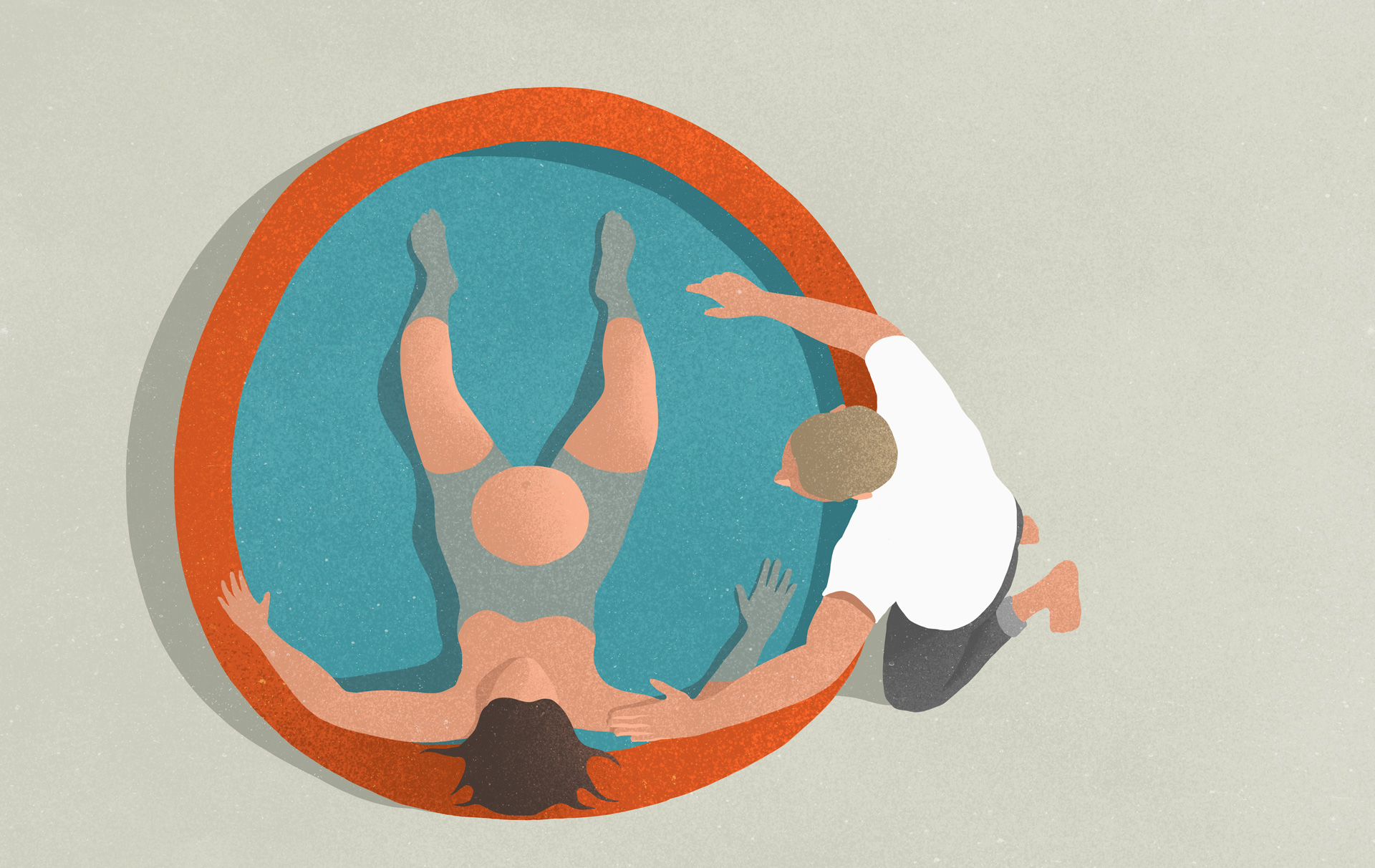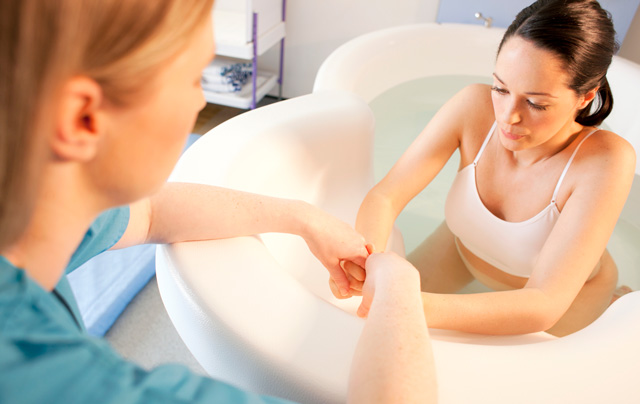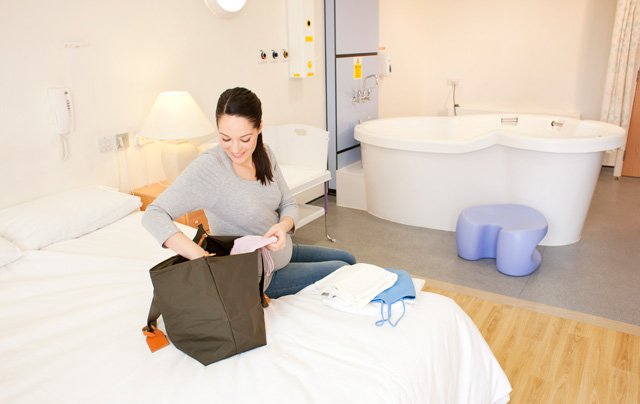Water birth pros and cons: Should you have a water birth?
Are you thinking about having a water birth? Three experts explain the pros and cons of giving birth in water


Water birth might be becoming a bigger trend but what should you take into consideration before deciding if you should have one or not?
The pros and cons of a water birth are widely discussed, with many mums saying the benefits they experienced included having a more relaxed labour.
A water birth is the process of giving birth in water. This could be in a deep bath or birthing pool, and can be in a hospital, birthing centre, or at home. In some cultures, water births also take place in the sea or a river.
Being in water during labour can help with pain, but mums who haven't experienced a water birth before may be concerned about potential risks.
What is a water birth?
'A water birth is when a baby is born under water, usually in a specifically designed birthing pool or bath, or it is when the mother is in the water for the birth,' says Katie Headlam, midwifery sister at the Fatima Allam Birth Centre, which is part of Hull University Teaching Hospitals NHS Trust.
'Some women spend their labour in the pool, then come out to give birth, while others stay in the pool to give birth. It will all depend on what suits you at the time,' says Mervi Jokinen, practice and standards professional advisor for the Royal College of Midwives.
'Your midwife will monitor your baby throughout labour and the birth,' she continues. 'It is possible the midwife may ask you to come out of the water for short periods for examinations, such as for a vaginal examination, although you can stay in the water for these if you choose.'
GoodtoKnow Newsletter
Parenting advice, hot topics, best buys and family finance tips delivered straight to your inbox.
'Don’t worry about your baby being born in the water: the midwife will be there to bring them gently to the surface,' she adds. 'Your baby will breathe when it comes out of the water and meanwhile will be getting their oxygen through the umbilical cord. You can stay in the water to birth your placenta as well.'

Who can have a water birth?
'Most NHS trusts will have a guideline recommending that women choosing to labour and give birth in water should be in good health, have experienced a normal pregnancy with no risk factors and should be in spontaneous labour at term,' says Katherine Hales, a senior midwife and national coordinator for the Association of Radical Midwives.
'Women who wish to have a water birth should explore any risks and benefits and discuss these with the clinical team,' she adds. 'Generally speaking, there are some situations where a water birth may be definitely unadvisable. These include if a woman has a condition which puts her at risk of loss of consciousness or seizures. Or there are concerns that the baby is compromised or premature.'
'Most women can have a water birth and spend all or part of their labour in water,' says Mervi. 'Unless your baby is in a breech position, if you are having twins or triplets, or if your labour is induced.'
If you're not sure whether you'll qualify, Katherine recommends that 'any woman who is interested in labouring or giving birth in water should explore the possibilities with her midwife.'
Is it safe to have a water birth?
'If you birth in water it will be a vaginal birth,' explains Mervi. 'But they are just as safe as a birth out of water. You would need to come out of the water, however, if you need an intervention such as ventouse or forceps.'
'There are situations where there may be risk if there are pre-existing medical conditions or the suspicion of these,' adds Katherine. But aside from that a water birth could actually be of benefit. 'There is evidence that using water in labour and birth may reduce the level of medical interventions in labour. And one may improve overall outcomes for the mother and baby.'

Water birth pros and cons: What are the benefits and the risks?
Water birth benefits
- Positive birthing experience
- More relaxed and comfortable labour
- Eases pain of contractions and labour
- Aids mobilisation for the birth
- Immediate skin-to-skin contact with baby
- Greater sense of privacy
- Babies born in water can be calmer
- Less likely to need medical interventions (such as a ventouse birth or episiotomy)
While it may not be for everyone, there are numerous reasons to consider a water birth. 'The main benefits of a water birth relate to the positive birthing experience,'says Katie. 'In particular, in terms of a woman’s level of comfort and control.'
'The water can also aid mobilisation for the birth,' she adds. 'And most babies born in water also have immediate skin to skin contact with their mothers, which has many benefits in itself, such as better thermoregulation, which can help with breastfeeding.'
'There is likely to be a sense in which the woman feels that she has more privacy and safety in the water due to the fact that she is generally alone in the pool,' adds Katherine. 'Midwives don't usually aim to join her in the water. The importance of this is due to the fact that the optimal interaction of the hormones needed for labour to progress well rely on the woman feeling safe and private; anything perceived by her to be an invasion or giving her alarm may cause labour to slow down or stop.'
She adds: 'And, anecdotally, babies born in water often seem calmer and in very good condition at birth.'
'Many women find that birthing in water helps them to relax, helping to lower blood pressure, and say it eases the pain they feel during contractions and the birth, so they need less pain medication,' says Mervi. 'Also, because you are buoyant in the water, it's easier to move into positions that suit you and help you to feel more comfortable.'
'The evidence also suggests that if you labour in water, you are less likely to need interventions such as a ventouse birth and you may be less likely to need an episiotomy,' says Mervi. 'This is where a doctor or midwife may need to make a cut in the area between the vagina and anus (perineum) during childbirth to help prevent tearing of the vagina during the birth.'
Risks and 'cons'
- Unpredictable availability of birthing pools in hospitals
- You cannot have an epidural or opiate pain-relief drugs if having a water birth
- Can slow down your contractions
- Small chance baby may try to take a breath spontaneously under the water
- Getting in and out of the water for pain relief may add stress to the process
'There is a very, very small chance that a baby may try to take a breath spontaneously under the water themselves before being brought up to the surface,' says Katie. 'However, if this occurs midwives take appropriate action to help.'
If there are concerns that the mother will bleed she will require a normal birth. This is because 'midwives are not able to measure blood loss after the birth as accurately in water,' says Katie. 'Other risks and complications may apply if a woman has a water birth when it's not been recommended,' she explains.

'Risks may exist where there were concerns about the health and wellbeing of the mother or the baby,' says Katherine. 'If caregivers are concerned, the woman would be requested to leave the pool and continue on "dry land". This is with a view to further monitoring or intervention if required.' she explains. 'Opiate drugs would not be given to a woman in water because of the effect on her ability to move and react quickly.'
'Sometimes labouring in water can slow down your contractions,' says Mervi. 'Though if this happens you can come out of the water to continue your labour.'
Is a water birth less painful and can you have a water birth with an epidural?
'Some women report that labouring in water eases the contraction pains and the pain of the birth itself,' says Mervi. 'Unfortunately, if you have an epidural it is not possible to have a water birth. This is because of the need to monitor the epidural site and keep it sterile and secure. You can have gas and air while in the water but you'd need to come out if you have a pain-killing injection such as pethidine, which can make you drowsy. You can get back in after a couple of hours once the effects of the injection have worn off.'
Having a water birth in hospital - what to expect
If you decide to have a water birth in hospital there are some positives and some drawbacks.
Hospitals have fully equipped birthing suites and some women feel safer in a hospital environment as there is quick access to intervention should they need it.
'If you're giving birth in a midwife-led unit or hospital they'll have dedicated rooms with a specialist large bath where you can give birth, or to get into to help relieve labour pains,' explains Mervi. 'These birthing pools have a special plumbing system. They often have mood lighting in and around the birthing pools,' adds Katie.

'However, there may be situations in hospital where there are not enough staff or pools available,' says Katherine. 'So there may be more constraint placed on the woman to ensure she doesn't enter the pool "too soon" before labour is established. This is to prevent a pool being blocked by a woman who turns out not to be quite established in labour,' she explains.
'Hospitals and birth centres may discourage partners from getting into the birthing pool,' says Katie. This won't be an issue at home.
What to expect if having a water birth at home
At home, a birthing pool is usually inflatable and it's the birthing partner’s responsibility to fill it, empty it and clean it after.
'It's still possible to have a water birth at home by hiring an inflatable pool,' says Mervi. 'Your midwife will take your temperature from time to time to make sure you are not getting too hot. You don’t have to stay in the water all the time. You can get in and out as it suits you. Just make sure you have someone to help you in and out in case you feel a little wobbly. Your partner can get into the pool with you if you want.'
'Labour often slows or stops when women are feeling nervous or uncertain,' says Katherine. This is something that can happen when a woman leaves her home to head to hospital. 'While labour at home is often less subject to that effect as the woman is in her familiar environment. Partners and other family members are free to move around and there is access to food and drink more readily. This will be the right decision for some women. Others may feel more confident to be in a hospital or birth centre.'

How much does a water birth cost?
'In the NHS, all births are free. No matter what type of birth you have or where you give birth,' says Mervi.
'At home, some people choose to purchase a birthing pool for a home birth. This usually costs a few hundred pounds, or around £30-£250 for birthing pool hire,' says Katie.
Most women use an NHS midwife, although there are private midwifes that will charge: 'The cost of booking a midwife to provide care requires on-call commitment. It can be 24 hours a day for up to five weeks depending on when labour occurs. And attendance for the labour,' says Katherine. 'She would also provide antenatal and postnatal care and other aspects of maternity care such as routine screening. The cost for this service depends – expect it to be around £4,000-£6,000 for a whole antenatal, birth and postnatal package,' she explains.
You could also hire a doula, although they aren't hired to deliver a baby but to provide support for the mother throughout childbirth, or postnatally.

Debra Waters is an experienced online editor and parenting writer. She also has a strong background on health, wellbeing, beauty, and food. She currently writes for Goodto and Woman&Home, and print publications Woman, Woman’s Own, and Woman’s Weekly. Debra has written for What to Expect, Everyday Health, and Time Out. In addition, she has had articles published in The Telegraph and The Big Issue.